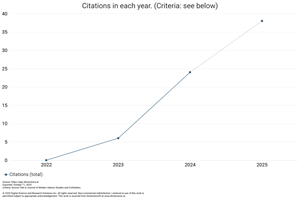Development of the Halal Industry in Indonesia: Opportunities and Challenges after the Covid-19 Pandemic
DOI:
https://doi.org/10.59653/jmisc.v1i03.194Keywords:
Halal Industry, Covid-19, Opportunities, ChallengesAbstract
The halal industry in Indonesia after Covid 19 has experienced growth, with Indonesia's population of 229.6 million in 2020, it has not been able to make Indonesia a supplier country for the needs of halal commodities in the world, there are many challenges that deserve joint attention to make Indonesia the center of the world's halal industry as targeted by the government in 2024 there will be two challenges in general, namely external challenges and domestic internal challenges, while opportunities for the halal industry in Indonesia are in the halal food sector, Islamic finance, halal tourism and Modest fashion. For this reason, this study aims to look at the Development of the Halal Industry in Indonesia regarding Opportunities and Challenges in the Post-Covid-19 Pandemic. This study uses a literature study, a descriptive approach, data and information collected from various literature from secondary data. Through this research, the authors hope to contribute to a portrait of the halal industry in post-pandemic Indonesia, so that they can see opportunities for development.
Downloads
References
Dewi, R. K. (2020). Mengenal Apa Itu PSBB, Aturan, Daerah Yang Menerapkan Hingga Sanksinya. Kompas. https://www.kompas.com/tren/read/2020/04/14/093800065/mengenal-apa-itu-psbb-aturan-daerah-yang-menerapkan-hingga-sanksinya?page=all
Difa Ameliora Pujayanti (2020). Industri Halal sebagai Paradigma bagi Sustainable Development Goals di Era Revolusi Industri 4.0. Youth & Islamic Economic Journal 9 (1): 1-12.
DPR. (2023).Status Pandemi Dicabut, Edy Wuryanto Berharap Penguatan Riset Demi Kemandirian Kesehatan. https://www.dpr.go.id/berita/detail/id/45185/t/Status+Pandemi+Dicabut%2C-+Edy+Wuryanto+Berharap+Penguatan+Riset+Demi+Kemandirian+Kesehatan
Fauzia and Dkk, Prinsip Dasar Ekonomi Islam Perspektif Maqashid Al-Syariah.
Irham Aqil, Presidensi G20: Peluang dan Tantangan Jadikan Indonesia Produsen Halal Dunia, (2022) https://kemenag.go.id/opini/presidensi-g20-peluang-dan-tantangan-jadikan-indonesia-produsen-halal-dunia-nf2hzl
Kamila, E. F. (2021). Peran industri halal dalam mendongkrak pertumbuhan ekonomi indonesia di era new normal. Jurnal Likuid, 1(01), 33–42 https://indonesia.go.id/kategori/feature/2794/indonesia-berpeluang-memimpin-industri-halal-dunia
Kemenpri. Industri Halal Berperan Penting dalam Pemulihan Ekonomi, Kemenperin Luncurkan IHYA 2022. (2022) https://kemenperin.go.id/artikel/23586/Industri-Halal-Berperan-Penting-dalam-Pemulihan-Ekonomi,-Kemenperin-Luncurkan-IHYA-2022
Kemlu. Peluang besar bagi Indonesia untuk menjadi pusat produsen halal dunia https://kemlu.go.id/vienna/id/news/18866/peluang-besar-bagi-indonesia-untuk-menjadi-pusat-produsen-halal-dunia
Masterplan Ekonomi Syariah Indonesia 2019-2024 Muawanah, M., Fauziah, N. D., Toha, M., & Manaku, A. C. (2021). The survival strategy of halal tourism in Covid-19 pandemic era. Indonesian Interdisciplinary Journal of Sharia Economics (IIJSE), 3(2), 165–177. https://doi.org/10.31538/iijse.v3i2.1104
Mubarok, F. K., & Imam, M. K. (2020). Halal industry in Indonesia; challenges and opportunities. Journal of Digital Marketing and Halal Industry, 2(1), 55. https://doi.org/10.21580/jdmhi.2020.2.1.5856
Nurjaya, Paramarta, V., Dewi, R. R. V. K., Kusworo, Surasni, Rahmanita, F., Hidayati, S., & Sunarsi, D. (2021). Halal tourism in Indonesia: Regional regulation and Indonesian ulama council perspective. International Journal of Criminology and Sociology, 10, 497–505
Nurul Huda, Ekonomi Pembangunan Islam (Jakarta: Prenada Media, 2017).
Nuryaman dan Veronica Christina. 2015. Metodologi Penelitian Akuntansi dan Bisnis Teori dan Praktek. Bogor: Kencana Prenada Media Group
Purwanto, Antonius. 2021. Ekonomi Dunia pada Masa Pandemi Covid-19: dari Dampak hingga Proyeksi Pertumbuhan 2021-2022. https://kompaspedia.kompas.id/baca/paparan-topik/ekonomi-dunia-di-masa-pandemi-covid-19-dari-dampak-hingga-proyeksi-pertumbuhan-2021-2022
Samsul. (2022). Peluang dan Tantangan Industri Halal Indonesia Menuju Pusat Industri Halal Dunia Al-Azhar Journal of Islamic Economics. http://ejournal.staialazhar.ac.id/index.php/ajie/article/view/135
Susanna, D. (2020). When will the COVID-19 Pandemic in Indonesia End ? Kesmas: Jurnal Kesehatan Masyarakat Nasional (National Public Health Journal), 15(4), 160–162. https://doi.org/10.21109/kesmas.v15i4.436
State of the Global Islamic Economy Report 2020/2021
State of the Global Islamic Economy Report 2021/2022
Syamsudin Mochtar. (2019). Studi Komparasi Pemikiran John Maynard Keynes dan Yusuf Qardhawi Tentang Produksi. Li Falah Jurnal Studi Ekonomi dan Bisnis Islam Volume 04 Nomor 2, 274 288.
Purwanto, Antonius. 2021. Ekonomi Dunia pada Masa Pandemi Covid-19: dari Dampak hingga Proyeksi Pertumbuhan 2021-2022. https://kompaspedia.kompas.id/baca/paparan-topik/ekonomi-dunia-di-masa-pandemic-covid-19-dari-dampak-hingga-proyeksi-pertumbuhan-2021-2022
Susanna, D. (2020). When will the COVID- 19 Pandemic in Indonesia End ? Kesmas: Jurnal Kesehatan Masyarakat Nasional (National Public Health Journal), 15(4), 160– 162. https://doi.org/10.21109/kesmas.v15i4.4361
Syamsudin Mochtar. (2019). Studi Komparasi Pemikiran John Maynard Keynes dan Yusuf
Downloads
Published
How to Cite
Issue
Section
License
Copyright (c) 2023 Yana Dwi Christanti; Nova Maulud Widodo, Choirul Daroji

This work is licensed under a Creative Commons Attribution-ShareAlike 4.0 International License.
Authors who publish with this journal agree to the following terms:
- Authors retain copyright and grant the journal right of first publication with the work simultaneously licensed under a Creative Commons Attribution-ShareAlike that allows others to share the work with an acknowledgement of the work's authorship and initial publication in this journal.
- Authors are able to enter into separate, additional contractual arrangements for the non-exclusive distribution of the journal's published version of the work (e.g., post it to an institutional repository or publish it in a book), with an acknowledgement of its initial publication in this journal.
- Authors are permitted and encouraged to post their work online (e.g., in institutional repositories or on their website) prior to and during the submission process, as it can lead to productive exchanges, as well as earlier and greater citation of published work (See The Effect of Open Access).
























